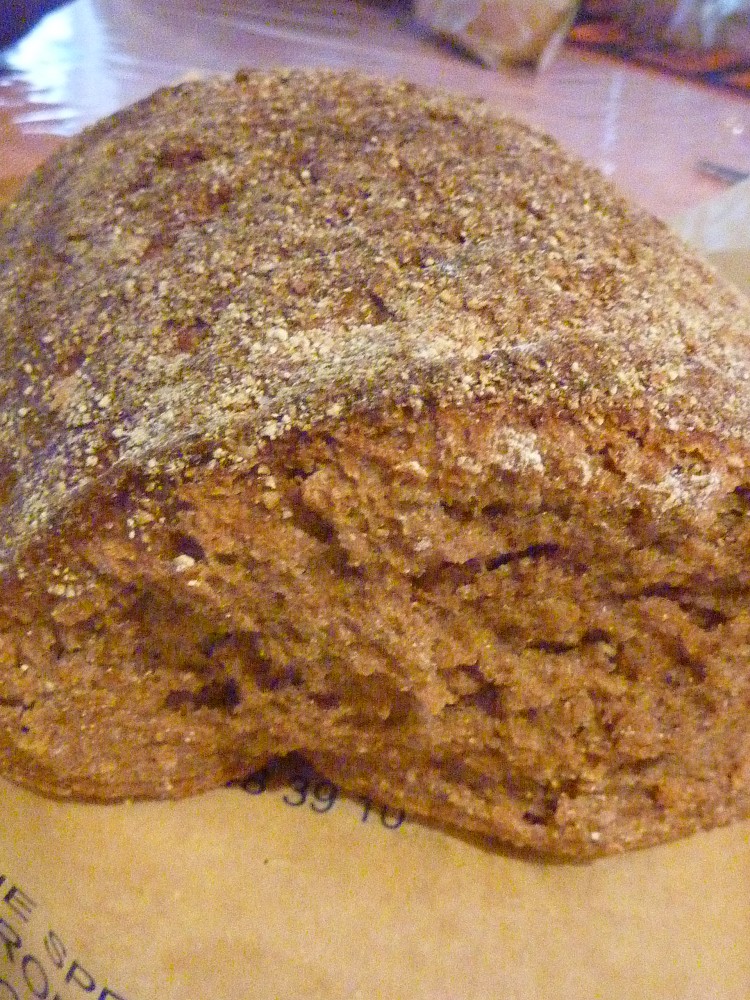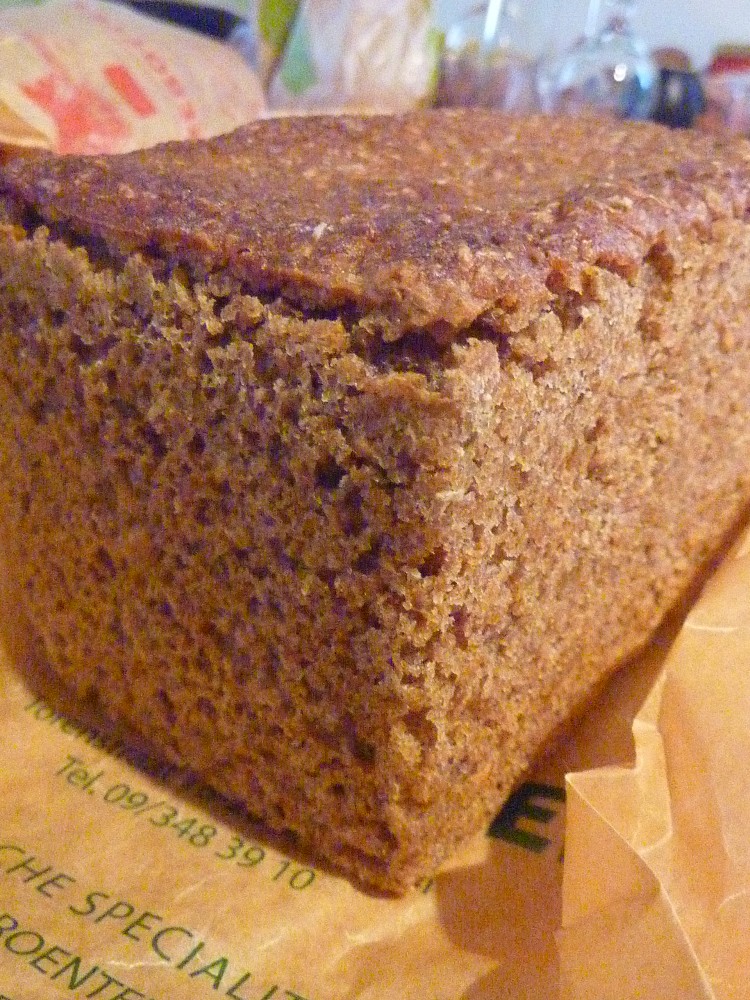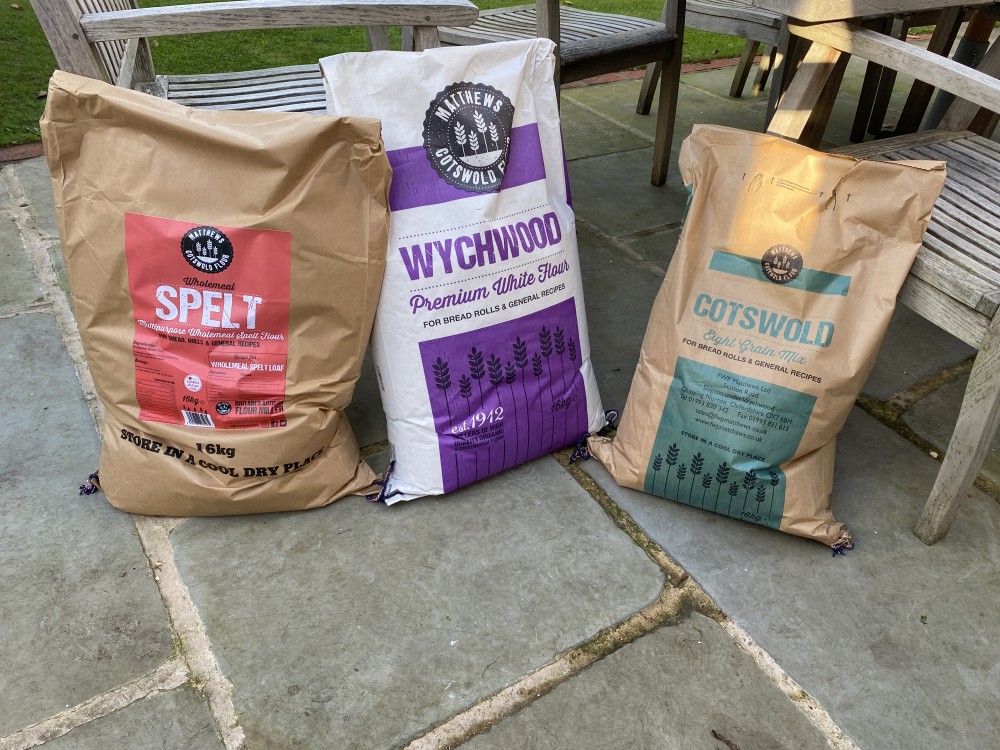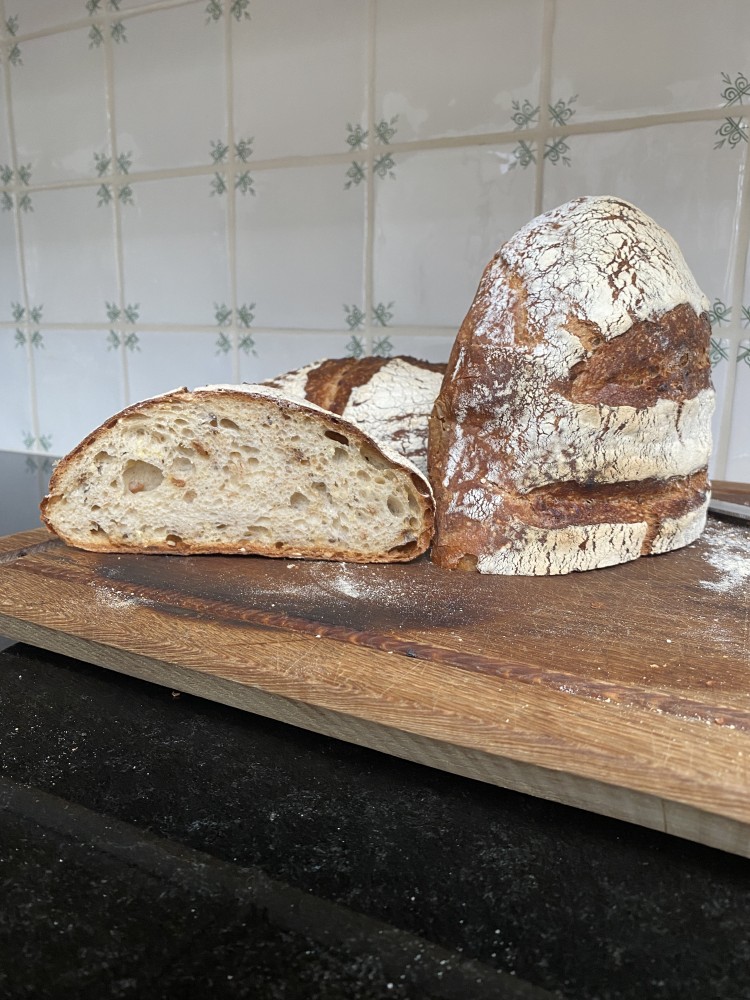Bread - What are you baking today…..
-
Yea–-I can see myself eating all of your bread.I would start off keeping things nice and simple.
Warm with butter to start.....and then, slice by slice getting progressively experimental. -
Bread - what am I buying today… I always buy sourdesem breads through my hippy store... There's a handful of bakeries but hundreds of styles to choose from... All organically made, they weigh like fucking bricks, and the best thing is you can't even have your heavy breads cut at his store... His machine can't handle 'm... I gotta go to my store where we have an industrial machine, and cut 'm there...
Here's some German style... A Munster and an Emmerlinger (walked into a bar):
-
Wow! You guys aren’t messing around. It all looks so great. I’m going to have to kick it up a notch. Made two boules this week in the Dutch Oven. One was definitely better than the other

But it’s definitely ignited my bread making again.
These were both just all purpose flour, water, salt and dry yeast.
I’ll let you decide which one was first
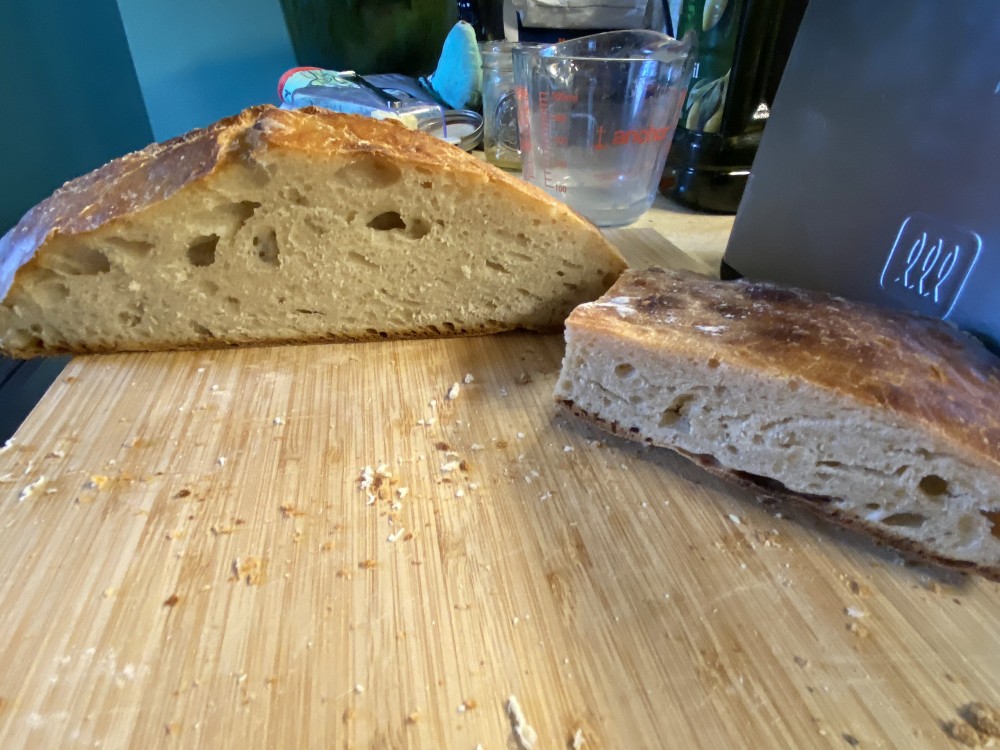
-
Looks amazing, you beeing a Doctor and still having time to bake makes my argument of working to much for baking melt away

cheers @Steffen I started baking bread during covid-19 lockdown (as so many other) with more spare time then I usual have. First breads were levain breads which can be quite time consuming as you have to look after your sourdough daily. At the moment I am baking once a week, mostly preferments/overnights like Biga or Poolish. You start your predough in the evening and can bake the next morning/noon. With me it's usually Tuesday evening starting Biga and baking Wednesday around noon. Wednesday is the day when I write my referall letters (and bake bread additionally). @neph93 is a teacher, is renovating a house, has a pack of children and has still time to bake breads for the whole gang. So I think if you really want to do it and finally get some routine it is not that big thing.
-
Looks amazing, you beeing a Doctor and still having time to bake makes my argument of working to much for baking melt away

cheers @Steffen I started baking bread during covid-19 lockdown (as so many other) with more spare time then I usual have. First breads were levain breads which can be quite time consuming as you have to look after your sourdough daily. At the moment I am baking once a week, mostly preferments/overnights like Biga or Poolish. You start your predough in the evening and can bake the next morning/noon. With me it's usually Tuesday evening starting Biga and baking Wednesday around noon. Wednesday is the day when I write my referall letters (and bake bread additionally). @neph93 is a teacher, is renovating a house, has a pack of children and has still time to bake breads for the whole gang. So I think if you really want to do it and finally get some routine it is not that big thing.
Your absolutley right @Chap I´m baking bread for a couple of years now on and off, during the Lockdown I had a part of my family sourdough here and cranked out 2-4 Breads a Week for Friends and Family, wehn work picked up again, a littler faster then i wouldve like i lost my routine and stopped baking bread. You´re right i probably should go for some Predough Overnight recipes and get a Routine in. My Favorite Sourdough Bread takes 16 Hours to get the Sourdough ready and then basiclly 3-4 hours constant care to get the dough ready, i simply dont have the time for that now.
-
For my part it is about routines and enjoyment. I know I enjoy making (and eating) the bread, and I also enjoy seeing my family enjoy and eat it, so I've tailored my routines to make it happen, around my work and family commitments.
I am able to work from home one morning a week, and apart from that I have weekends and evenings. The biga and poolish pre-ferments need 12 hours, and the bread can be real 3-5 hours after that. This means it can be started the night before with an overnight ferment, and baked the next day, or started early morning and finished before bed time, with the ferment happening while I'm at work. I then do the dough mixing and baking after the smallest kids are in bed.
As for sourdough, this is normally a weekend thing. The levain gets made Friday or Saturday morning, the dough gets mixed the same evening and the bake is the next morning. With the exception of planning the extra step (making the levain), and given that my weekend evenings rarely involve bars, nightclubs and wild parties anymore, the sourdough has less impact on my family time. This is because forming the loaves, proofing and baking takes less time out of a Saturday or Sunday than mixing the dough, folding and then doing the forming, proofing and baking, which is what the big/poolish loaves require.
-
I think so @neph93. The first recipe I used had me proof 3 times?! It definitely worked but the 3rd time wasn’t a charm. The 2nd loaf I only proofed once, different recipe. Going to get with my Dad, the bread expert in my life, and try his methods next. Hopefully get some sour dough started from him too

-
Pizza looks good @Steffen I made
Pizza on a Forkish biga dough this weekend. Six of them in fact.@Giles I need to look into the cost effectiveness of bulk buying like that. It may not work out given import costs…
Did a morning of home office work which allowed me to do a cheeky bake. 100% white, and 70% white, 30% eight corn, both based on poolish:



-
You guys are on another level now. Jesus Mary and Joseph
-
Hi all,
Great inspiring bakes!
I’ve been using the Forkish method for a while now and have been getting great results using bannetons and a dutch oven as recommended.
Weekly bakes have settled on firm family favourites like a 50% white poolish with grain & rye flour and a simple “Saturday white” but with about 40% malted grain added (“Cotswold Crunch”)One bake schedule I’ve struggled with it the overnight proofing in the fridge as the dough sticks to the bannetons. I’m pretty sure the bannetons are well ‘seasoned’ and I add extra flour each time I use them. Any additional advice/ tips?

Thanks in advance
Dan -
Nice looking loaves Dan…
I'm a just-chuck-more-flour-into-the-banneton kind of guy. Sometimes it works, but if it doesn't, it just adds an additional layer of rustic-looking to the loaf
 And sometimes I brush the excess flour off before placing in the oven, but usually, I don't bother.
And sometimes I brush the excess flour off before placing in the oven, but usually, I don't bother.My goto is Forkish 50% Poolish with 500gms white in the Poolish and 500gms eight-grain in the final mix. I get the eight-grain from Matthews, which I suspect is where you get your Cotswold crunch...
Yesterday's effort....
-
Cheers Giles.
Yes, I usually bulk buy white, 8 Grain & Cotswold Crunch from Matthews and then I use some random Rye flour (only about 100-150g per 1kg bake) bought from a local supermarket. -
Hi all,
Great inspiring bakes!
I’ve been using the Forkish method for a while now and have been getting great results using bannetons and a dutch oven as recommended.
Weekly bakes have settled on firm family favourites like a 50% white poolish with grain & rye flour and a simple “Saturday white” but with about 40% malted grain added (“Cotswold Crunch”)One bake schedule I’ve struggled with it the overnight proofing in the fridge as the dough sticks to the bannetons. I’m pretty sure the bannetons are well ‘seasoned’ and I add extra flour each time I use them. Any additional advice/ tips?
Thanks in advance
DanThose are two very nice loaves of bread @dan79
With sticky doughs I sometimes used hard wheat semolina to season the bannetons
-
@dan79 my best tip is in the vein of “mo’ flour” but specifically I season the bannetons but also the formed dough, before I place it in the banneton. This seems to help although whether it is just more flour making the difference I do not know.
Another good idea is to wet or flour your fingers and loosen the dough carefully before removing it. It doesn’t damage the form of the bread and allows you to discover the sticky bits and deal with them before any damage is done.
Finally I would also recommend the Forkish levain method, specifically the one for the Country Blonde. This calls for the bulk ferment to be done overnight and the banneton proofing to be done the next morning for about an hour or two. It allows you make great fruity, buttery bread and to otherwise dodge the whole issue of sticky bits [emoji1]

